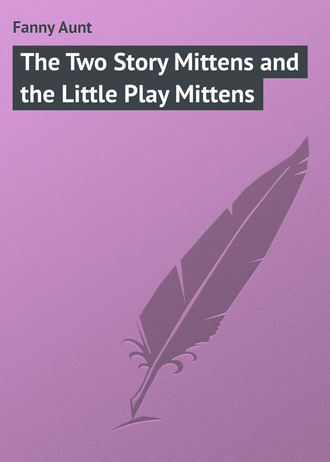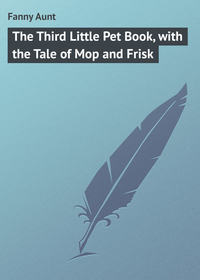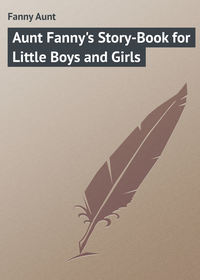 полная версия
полная версияThe Two Story Mittens and the Little Play Mittens
Edward. Love him – I cannot promise that.
Mrs. L. Why not, my son?
Edward. Because I have given all my love to my dear mamma (kissing her).
Mrs. L. You darling! kiss me again! Ah, Mr. Sherwood! can you blame me if I almost adore him?
[Exit Mrs. L.Scene VIIIMr. Sherwood. You are ungrateful, to vex and grieve a mother who loves you so dearly. If you loved her as much, you would obey her if she only held up her little finger; but it seems to me a cat-o'nine-tails flourished before you might have a very good effect.
Edward. I am sorry that —
Mr. S. Did you take your writing lesson to-day?
Edward. No, sir. I don't like writing lessons. They are a perfect plague. They give me the cramp in my thumb, and kinks in my fingers.
Mr. S. Essence of switch on the fingers is good for taking out kinks. Has your dancing master been here?
Edward. Oh yes! I love him dearly, he is so funny! He tells me comical stories, and can imitate everybody in the house. Andrew's lumbering, poking walk, Jane's prinking ways, and even you, with your long dismal face, your eyes staring at a book like a cat looking at a fish, and your solemn walk, oh, it would make you die a-laughing! His lessons always seem too short.
Mr. S. What is that sticking out of your pocket?
Edward (pulling it out and looking at it). Oh! ha, ha! It's a portrait I drew of you, as you look when I don't know my lessons.
Mr. S. Give it to me. (He takes the caricature and looks at it, but shows no anger.) So you prefer to spend your time in an unamiable, contemptible occupation like this, to acquiring useful lessons.
Edward (looking a little ashamed). Well, I like to be amused. It was only a little fun. It was not meant for you to see.
Mr. S. Will you give me an account of your reading to-day?
Edward. I – I – have not been reading, sir.
Mr. S. Not reading? Why?
Edward. Because the book you gave me had so many long, stupid words, that I couldn't understand what it was all about, so I just pitched it out of the window.
Mr. S. You call a book stupid which has such a thrilling account of the bombardment of Vera Cruz, with a fine engraving showing you the great General Scott and his brave soldiers? I wonder at you! You have a head, and so has a drum; both empty.
Scene IX. —Enter Mrs. Langdon, Mary Brown, and Morris, her sonMrs. L. See, my son, I bring you one of your best friends – your dear old nurse Mary, and her son, who is almost your brother.
Mary (running up to kiss him). How do you do, dear, dear child! how handsome you are! Here's your old play-fellow, Morris; don't you remember him?
Edward. No!
Morris (who has a nice little cream cheese wrapped up in a napkin). I remember you. You're my dear brother Edward. See – I have brought you this cream cheese; my mother made it on purpose for you – take it – don't you know me now?
Edward (who recoils, and takes twenty-five cents out of his pocket). Here, take this, Morris.
Morris (coloring indignantly). I did not ask you for money; I don't want it; I am not a beggar.
Edward. But I ought to pay you for the cheese.
Morris (with emotion). Do you think I brought it to you for money? I would rather have thrown it out of the window.
Mrs. L. Never mind, Morris, take the cheese home to your father; it will do him good to eat it.
Morris (taking it and giving it to his mother, and saying, in a disappointed tone), Well, take it, mother.
Mary (looking lovingly at Edward). How handsome he is! how he has grown! My heart warms to him.
Mrs. L. Well, Edward, your kind nurse must have some lunch – go and order some.
Edward (scornfully). Isn't Patrick here?
Mary. No, my son. I asked him to give my old pony some water.
Mrs. L. Go, my son, go; it will gratify me.
Edward. Oh! then I will fly. What shall I order?
Mrs. L. The very best in the house.
Morris (running after him). Wait, Edward, I will go with you, and help you give the order. I know what my mother likes.
Scene XMrs. L. Well, dear nurse, how do you get on since you have moved into your new cottage?
Mary. Oh! capitally, ma'am.
Mrs. L. And your husband, big Peter – is he pleased and contented?
Mary. He is so, ma'am, as happy as a king! Daisy – that's our cow, ma'am – has just given us a beautiful calf; we have fifty chickens, twenty geese, and a good old pony who carries our vegetables to the railroad station for the New York market. I thank God, and you who have been so good to us.
Mrs. L. Is big Peter industrious, and does he bring up Morris in the right way?
Mary. Oh! thank God again for all his mercies. I am not proud; but my boy is the best boy in the whole neighborhood, and so smart! he reads in the biggest books; he does the most terrible long sums, almost like a flash of lightning – his schoolmaster is astonished at his quickness; his head is just as full as it can hold of learning, and his heart is just as full of love for his father and mother. (She falters, and the tears rush into her eyes).
Mrs. L. (very kindly). I am delighted to hear this; he will always be a comfort to you if he is so good now. But here he comes – he looks distressed.
Scene XI. – Mrs. Langdon, Mary, Mr. Sherwood, and MorrisMorris (crying and rubbing his eyes). Oh, dear!
Mary. What's the matter, my son? Have you had a tumble?
Morris. No, mother; never mind.
Mary. But tell me, what has happened?
Morris (trying to lead her away). Come, mother, let us go away.
Mrs. L. Where Is Edward?
Morris. In the garden, ma'am. Come, mother, come; I want to go home. I don't like this place.
Mrs. L. No doubt Edward is picking a basket of fruit for you.
Morris. I rather think not. Mother, I beg you to let us leave at once. I have my reasons.
Mr. S. And I can guess them. Edward has been beating you – has he not?
Mrs. L. Impossible!!!
Morris. Very possible, indeed. In fact, quite certain.
Mrs. L. Dear me! did he hurt you much?
Morris. It is not the pain. I could have beaten him twice as hard if I wanted to. What hurts me most is what he said.
Mrs. L. And, pray, what did he say?
Morris. Well, ma'am, when I wanted to hug old Beppo, he told me to take my paws from the dog's neck; that I was a country bumpkin, and a big clumsy booby, and no brother of his; and the sooner I skedaddled home the better he should be pleased.
Mary. Oh! the unnatural, wicked boy! You are right, my son; we will go home, where we are not despised. Good bye, Mrs. Langdon; Master Edward is your son; but I no longer think of him as the child I fed at my breast, and loved nearly as my own. He has struck his brother! Come, my son, you are not his equal; therefore you cannot be his friend.
Mrs. L. But listen one moment, Mary.
Mary. No, ma'am; we will not stay where we have been so humbled; we are plain country folks, but we have hearts and feelings, and your son has neither. God will never bless him. Such pride has no place in heaven.
Mrs. L. You are right, Mary; but perhaps Morris offended him. You have not heard both sides.
Morris. Yes, I offended him. I put my arms round his neck to hug him, when he threw me off; and when I said that that was not the way to treat a brother, he struck me! – more than once, too! – and said those mean, cruel things.
Mary. Oh, the little villain!
Mr. S. Are your eyes still blinded, Mrs. Langdon? Can you still find excuses? Will you praise his good heart when he dares to ill-treat and strike his nurse's son?
Mrs. L. (weeping). No, I cannot excuse him; his ingratitude and wicked conduct have nearly broken my heart. What shall I do?
Mr. S. I have just thought of a plan, madam. It is a desperate remedy; but I know of nothing else in the wide world that will cure him.
Mrs. L. Tell me – what is it?
Mr. S. (aside). Nurse, send away your son for a few moments; he must not know what I am about to say.
Mary. I understand, sir. Morris, go to the stable, and see if old Whitenose has eaten all he wants.
Morris (jumping up with animation). I am to put him to the wagon, am I not? and then we are to go home. Oh, I am so very glad.
[Exit.Scene XIIMrs. L. We are alone now, Mr. Sherwood. Ah, if you knew how much I loved my son, and how unhappy I am!
Mary. I love him, too, in spite of his bad heart.
Mrs. L. Well, what are you going to propose? To have him beaten black and blue? I am ready for anything.
Mr. S. Don't be alarmed, madam. It is his heart that is to be put to the trial; reverses and adversity often soften the heart; when one has suffered, he knows better how to pity the deprivations and sufferings of others. Your son has never been contradicted; he may be unkind and cruel sometimes from thoughtlessness and ignorance. Now, let us put his heart to a severe trial. Let us pretend that he is Mary's son, and Morris is really your son. Push the experiment so far as to send him to live with her, until he is thoroughly humbled, and his faults disappear.
Mary (starting up). Oh, no! no! Your trial may all be very fine, but I will not lend myself to it. No, sir. We are not rich, but we have always been honest, and I will not have anybody suppose for a moment that I could have committed such a dishonorable, such an unnatural act. Say that Morris is not my son? If I should join in such a trick, my husband would hate and despise me, and rightly too.
Mr. S. But, nurse, you forget. It is only supposing.
Mary. Suppose as much as you please, sir; even the suspicion of such a plot would blacken my name forever. Oh! would any woman deny her own child?
Mrs. L. Listen to me, Mary. I love Edward as much as you do Morris. Do you think I would abandon my child or disgrace you? Far from despising you, I shall take care to let everybody know the sacrifice you are making for my son's sake; and every one will praise you for helping me, and believe that love for Edward has alone induced you to consent to this plan. If he should grow up to be a man with such selfish, cruel ways, it will break my heart. I should be in my grave before many years, killed by the misconduct of my only child. I have but one objection to what we are about to do. We shall practise a deception.
Mary (weeping). Oh, ma'am, and my son, my poor little Morris, he too must be deceived; he cannot be in the secret.
Mrs. L. I will try to make him happy. I will treat him like my own child. Remember it is only for a week or two, perhaps only for a day or two.
Mary. Oh yes, ma'am, I know you will be kind; but suppose in that week, your fine house, your gay clothes, your grand dinners and suppers should turn his head, and ruin his loving heart for his parents. If he should return to us, despising our humble life, – oh! I can't bear it! My child would be worse than lost to me!
Mrs. L. Fear nothing, Mary. Morris is an excellent boy, and not so easily spoiled. I promise you, that I will so arrange matters, that he shall be only too glad to come back to you, and be Morris again.
Mary (coming to Mrs. L. and taking her hand). Are you sure? will you solemnly promise this?
Mrs. L. (raising her hand). I solemnly promise.
Mary (still weeping). Well, then, try your trick; but, oh! do not let it last too long.
Mrs. L. (rings the bell; the servant appears). Call Master Edward and Morris here.
Enter Edward and MorrisEdward. Dear mamma, do you want me?
Mrs. L. I told you to order some luncheon for your nurse, and your brother.
Edward. Well, I thought when they were ready, they could go into the kitchen.
Mrs. L. (covering her face). Oh! Edward —
Edward. What is the matter, dear mamma?
Mrs. L. (aside). Oh! how shall I say it! (Aloud.) Do not give me that sweet title any more.
Edward. What? Mamma, what do you mean?
Mrs. L. Edward, I am about to tell you something that will pierce your heart; turn your dear face away from me. You —you are not my child.
Edward (turning deadly pale). Not your child?
Mr. S. No, sir; and perhaps what seems to be so great a misfortune now coming upon you, may prove a blessing in disguise.
Edward (clasping his hands convulsively together). Not your child?
Mr. S. Yes; through love and ambition for their own son, Mary and her husband were weak enough to change you for the son of Mr. Langdon; to change the name and dress of the two infants, was all that was necessary.
Mrs. L. And now, Mary, repenting of this, has made me a confession. Morris is my son and you are hers.
Edward. You are not my mother?
Mrs. L. No, Edward; but take heart. I shall still love you and take care of you. Come, Morris; come, my real son, do not cry; come to me.
Morris (rushing into Mary's arms). Oh, no! no! Mr. Edward has been your son for so long; keep him, keep him. I cannot leave my mother, I must go home with her (bursting into tears).
Mary. But, Morris, he is my son.
Morris. Oh no, dear mother, he will never love you as I do! do not drive me from you! do not turn your face away! kiss me, mother, and tell me you will take me away with you. Oh, I see! I must believe it (wringing his hands with grief).
Mrs. L. Morris, you are ungrateful! Do you not see what a splendid change this is for you?
Morris. Please excuse me, ma'am; I honor and respect you; but my mother, who nursed me, and has taken care of me all these years, I love her. Edward is much handsomer, and far more genteel than I. Oh! keep him and let me go with my mother! – (clasps his hands and kneels, while large tears roll down his cheeks).
Mrs. L. I order you to come with me. I will have it!
Mr. S. Remember, she is your mother.
Morris (weeping bitterly). Oh, how miserable I am!
[They go out.Edward (who now thinks himself Morris, remains).
Mary. Well, Morris; that's your name now, you know – what's the matter? are you sorry to have me for a mother? I shall have to sleep with one eye open, to keep you out of mischief; but if you are good and work hard, though I can't give you such fine clothes, I will love you as much as Mrs. Langdon did.
Edward (his lips quivering). Oh! she is no longer my mother!
Mary. Well, am I not as good? I don't live in such a fine house, crammed full of gimcracks; but I've got a dictionary that you can study in, and big Peter, your father, shall hang a great switch over the mantelpiece, to remind you that he won't stand any nonsense, or idleness, from you. Dear me! how glad he will be to see you! Come, run with a hop, skip, and jump, to the stable, and harness up old Whitenose: it's high time we were off.
Edward (sighing). Yes, mother.
Mary. But first bid Mr. Sherwood good-by, and the rest. Thank them all for their kindness to you; wait here a moment, till I come back.
[Exit.Mr. S. Well, Edward, or Morris I should say, you see that nothing is sure in this world: and I cannot but think that this reverse will do you good. You treated every one except your mother – as you supposed Mrs. Langdon was – with harshness, insult, and insolence: perhaps now you will learn, in the very strongest manner, the exact meaning and intention of the Golden Rule.
Edward. Oh, how unhappy I am! The very servants are more fortunate! They at least can live with Mrs. Langdon.
Mr. S. You despised and insulted your own mother; you struck your brother; suppose he in return should —
Edward (weeping). Oh stop, I beg, Mr. Sherwood!
Mr. S. You weep because you are only the son of Mary and big Peter, a poor country farmer.
Edward. Oh no, sir! if they are my father and mother, I will try to respect them, but to leave Mrs. Langdon – to be no longer her son – that is what is driving me to despair. Oh, I shall die! I shall die!
Mr. S. Do not be so distressed. Mrs. Langdon will still be very kind to you. She will love you still.
Edward. If she will only think of me sometimes. Will you speak, sir, of me to her, after I am gone? Will you tell her that my greatest grief, is leaving her; that I shall never, never, never forget her? Will you do this, dear Mr. Sherwood?
Mr. S. (with agitation). Yes, my dear boy, I will.
Edward. And will you forgive me for having profited so little by your lessons; and being so often disrespectful? Please forgive me, sir.
Mr. S. Willingly, my child. This is a great change of fortune. An hour ago, you were rich and well born, now you are the son of a poor farmer. Try to do your part well in this altered sphere; be gentle and good, and God will not desert you. Good-by.
[Exit. Enter Jane, with a coarse cap and jacket, Patrick followingJane (ironically). How do you do, Mr. Morris?
Patrick. (ditto). Your humble servant, Mr. Morris.
Jane. Will Mr. Morris allow me to show him his new dress?
Patrick. Will Mr. Morris give me leave to help him on with his jacket?
Jane. Dear me! it fits him to a hair! and the cap too! My! I'm a thinking you won't be so proud after this; you can't treat me any more as a servant.
Patrick. Nor me! You won't beat a double tattoo about my shins again in a hurry!
Jane. I shan't be snubbed all day long, and told that my nose is as red as my hair, and my eyes as green as my understanding. What a comfort!
Patrick (cutting a caper in the air, and singing). Hi fol-de-rol! how happy we shall all be! tide-o riddle rol-de-da!
Jane. What are you crying for, Master Morris?
Edward. Oh, how you treat me!
Jane. Why! Is not that the way to read the proverb? "As you have done to others, they shall do to you."
Patrick. You don't seem to see it. We are only giving tit for tat.
Edward. You are right, I deserve it all! Jane, Patrick, forgive me! I beg your pardon.
Jane (looking very sorry). Poor child! poor little fellow!
Patrick. After all, he has not a bad heart!
Edward. Please forget all the injuries I have done to you, and try not to hate me when I am gone. Will you, dear Jane? will you Patrick?
Jane (bursting out crying). Oh! oh! what a pity, what a pity!
Patrick. It is dreadful!
Jane. He will have to plough and hoe in the ground!
Patrick. And kill pigs, and drive the cow!
Jane. Why couldn't that stupid Mary hold her tongue after keeping the secret thirteen years, and settle down for life with that clumsy Edward. I hate the sight of him! I don't believe, but what it is all a trick she is trying to play off.
Patrick. I'll bet my head, it is!
Edward. Don't insult my mother. She is poor, but honest. I cannot hear you accusing her.
Enter Andrew with a basket, shovel, and rakeAndrew (whistles). Wheugh! Is it true then, that Master Edward is not Mrs. Langdon's son?
Jane. Yes, indeed! Just look at the poor boy; we are so sorry for him! and though he has teazed us a great deal, we feel for him with all our hearts.
Andrew. Just so with me. He has put me in a rage no end of times, and when I was scolded before you all, this morning, I was as mad as a wasp with the toothache. But since I have heard of his great misfortune, I am sure, I would not bear him malice for the world; so I have come to make friends with him, before he goes away.
Edward. Dear Andrew! (He weeps again.)
Andrew. Here! I have brought you a basket and some tools; they will be useful to you in your new situation; and here is my silver watch, it goes splendidly! but you must not wear it every day, you must save it for Sundays. I give it to you, that you may remember me, and say, "My friend Andrew gave me this watch, because he loved me."
Edward. How kind you are to me, who have deserved it so little! Pray forgive me, and forget my bad conduct.
Andrew. I forgive you with all my heart! and now that you are in trouble, I remember nothing. I will come to see you next Sunday evening, and bring you some nice little present. Keep up a stout heart, and a stiff upper lip; you are not used to work, and at first it will come very hard; ploughing is not quite so easy as playing cat's cradle, and backgammon in the parlor. You will have no dancing, unless a mad bull gallops after you, when, no doubt, you will practise double quickstep to perfection. All the gay pleasures you have now, will be lost to you; but there is one happiness, worth all the rest, which you can keep if you please; and that is a clear conscience. Serve God, love your parents, and work faithfully, and you will be sure to possess this great blessing, and consequently be happy.
Edward. Thank you, Andrew, for such good advice; but will you all love me when I am gone?
All three at once. Yes, indeed! Always!
Edward. Will you then promise, sometimes to speak kindly of me to Mrs. Langdon?
Andrew. We promise.
Jane (crying bitterly). Oh! oh! this is too much. I can't bear it. Good-by, dear Master Morris.
Edward. Won't you kiss me, Jane?
Jane. Oh, yes, with all my heart. (Kisses him.)
Patrick. Please shake hands with me, Master Morris.
Andrew. And me too.
Edward. Good-by, good-by; all my dear friends!
Enter the real MorrisEdward (who has turned away and don't see him). And this is the dress I am always to wear. I am Morris, son of Mary and big Peter! Oh, I can bear that; but to leave Mrs. Langdon – to be no longer her son – to have no right to her love – oh! oh! I shall die!
Morris. Good morning, brother.
Edward (without turning round). Good morning, Master Edward.
Morris. You seem angry with me; but you are wrong. If I have injured you, it is not my fault. I did not do it of my own will; and yet I have come to beg your pardon.
Edward. It is not your fault.
Morris. But – don't you love me?
Edward. Why do you ask, sir?
Morris. I call you "brother," and you call me "sir."
Edward (with effort). Well, if you wish it, I will call you brother.
Morris. And love me like one?
Edward. Yes.
Morris. Well, now, I'm going to try you. Here, do you see these things? I found them in your pockets. This gold watch, this pocket book full of money, this yellow pin, with a little ball in the middle of it, which looks like glass – I really thought it was glass, and the pin copper, but they say it is a diamond set in gold, and worth more than all the rest. Then I asked Mrs. Langdon if she had given me all these grand things to do just as I pleased with. She said, "Certainly" – and I have come as fast as ever I could with them to you! – take them!
Edward. Thank you. I'd rather you kept them.
Morris. Do you refuse your brother?
Edward. What could I do with such finery – they do not suit my humble station?
Morris. But it is not for yourself that I give them.
Edward. I don't understand you.
Morris. They are for your poor mother; for your father who works so hard, and is so patient and good. To scrape together money enough to pay his rent troubles him dreadfully; and so the very first time the landlord comes, give him all these gimcracks, on condition that he leaves him alone for the rest of the year.
Edward. Yes, I will do this; give them to me.
Morris. Here they are. Will you promise me one thing more?
Edward. What is it?
Morris. It is that you will love your father and mother dearly.
Edward. Yes, Morris; I will try.
Morris. And tell them every day that I shall never forget them; and when I am a man, and you are too, you shall all come and live with me, and you and I will have everything together, just like two brothers – will you?
Edward. Yes, brother – (Morris clasps him in his arms, and says) – "Oh, how happy you have made me!"
Enter Mrs. Langdon, Mr. Sherwood, and MaryMrs. L. Ah! that is a pleasant sight. I am delighted to see you such good friends. I wish you to love each other always.
Morris. I promise you we will, ma'am – I mean, mother. We are friends and brothers from this day.









